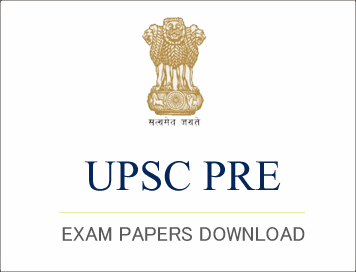(Answer Keys) IAS Preliminary CSAT Paper-2: 2013 "Test Booklet - B"

Union Public Service Commission
IAS Preliminary (CSAT) Exam, 2013
Actual Paper of the IAS PRE Exam, held on 26 May 2013.
CSAT Paper-2 "Test Booklet Series - B"
Directions for the following 8 (eight) items :
Read the following four passage and answer the items that follow each passage. Your answers to these items should be based on the passage only.
Passage – 1
The subject of democracy has become severely muddled because of the way the rhetoric surrounding it has been used in recent years. There is, increasingly, an oddly confused dichotomy between those who want to ‘impose’ democracy on countries in the non-Western world (in these countries’ ‘own interest’, for course) and those who are opposed to such ‘imposition’ (because of the respect for the countries’ ‘own ways’). But the entire language of ‘imposition’, used by both sides, is extraordinary inappropriate since it makes the implicit assumption that democracy belongs exclusively to the West, taking it to be a quintessentially ‘Western’ idea which has originated and flourished only in the West.
But the thesis and the pessimism it generates about the possibility of democratic practice in the world would be extremely hard to justify. There were several experiments in local democracy in ancient India. Indeed, in understanding the roots of democracy in the world, we have to take an interest in the history of people participation and public reasoning in different parts of the world. We have to look beyond thinking of democracy only in terms of European and American evolution. We would fail to understand the pervasive demands for participatory living, on which Aristotle spoke with far-reaching insight, if we take democracy to be a kind of a specialized cultural product of the West.
It cannot, of course, be doubted that the institutional structure of the contemporary practice of democracy is largely the product of European and American experience over the last few centuries. This is extremely important to recognize since these developments in institutional formats were immensely innovative and ultimately effective. There can be little doubt that there is a major ‘Western’ achievement here.
1.Which of the following is closest to the view of democracy as mentioned in the above passage ?
(a) The subject of democracy is a muddle due to a desire to portray it as a Western concept, ‘alien’ to non-Western countries.
(b) The language of imposition of democracy is inappropriate. There is, however, a need to consider this concept in the backdrop of culture of ‘own ways’ of non-Western society.
(c) While democracy is not essentially a Western idea belonging exclusively to the West, the institutional structure of current democratic practices has been their contribution.
(d) None of the Statements (a), (b) and (c) given above is correct
2. With reference to the passage, the following assumptions have been made :
1. Many of the non-Western countries are unable to have democracy because they take democracy to be a specialized cultural product of the West.
2. Western countries are always trying to impose democracy on non-Western countries.
Which of the above is/are valid assumption/assumptions ?
(a) 1 only
(b) 2 only
(c) Both 1 and 2
(d) Neither 1 nor 2


